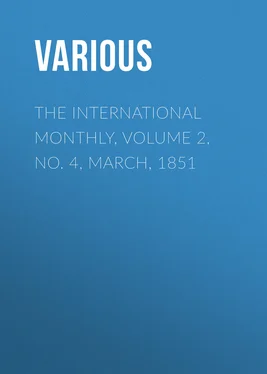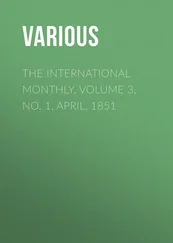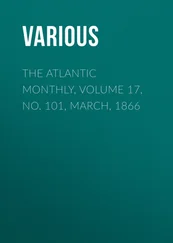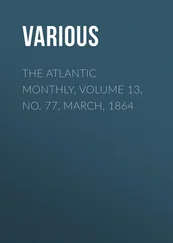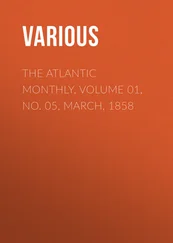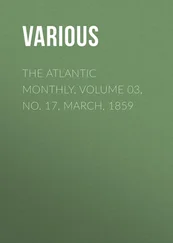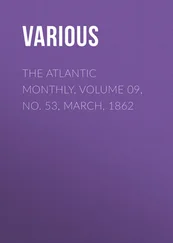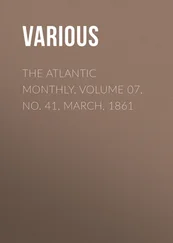Various - The International Monthly, Volume 2, No. 4, March, 1851
Здесь есть возможность читать онлайн «Various - The International Monthly, Volume 2, No. 4, March, 1851» — ознакомительный отрывок электронной книги совершенно бесплатно, а после прочтения отрывка купить полную версию. В некоторых случаях можно слушать аудио, скачать через торрент в формате fb2 и присутствует краткое содержание. Жанр: foreign_antique, periodic, foreign_edu, на английском языке. Описание произведения, (предисловие) а так же отзывы посетителей доступны на портале библиотеки ЛибКат.
- Название:The International Monthly, Volume 2, No. 4, March, 1851
- Автор:
- Жанр:
- Год:неизвестен
- ISBN:нет данных
- Рейтинг книги:5 / 5. Голосов: 1
-
Избранное:Добавить в избранное
- Отзывы:
-
Ваша оценка:
- 100
- 1
- 2
- 3
- 4
- 5
The International Monthly, Volume 2, No. 4, March, 1851: краткое содержание, описание и аннотация
Предлагаем к чтению аннотацию, описание, краткое содержание или предисловие (зависит от того, что написал сам автор книги «The International Monthly, Volume 2, No. 4, March, 1851»). Если вы не нашли необходимую информацию о книге — напишите в комментариях, мы постараемся отыскать её.
The International Monthly, Volume 2, No. 4, March, 1851 — читать онлайн ознакомительный отрывок
Ниже представлен текст книги, разбитый по страницам. Система сохранения места последней прочитанной страницы, позволяет с удобством читать онлайн бесплатно книгу «The International Monthly, Volume 2, No. 4, March, 1851», без необходимости каждый раз заново искать на чём Вы остановились. Поставьте закладку, и сможете в любой момент перейти на страницу, на которой закончили чтение.
Интервал:
Закладка:
Again we were received courteously and kindly by the lady we had formerly seen; and again she blandly offered to show us the house. We went up a little winding stair, and into several neat, clean bedrooms, where every thing was so old-fashioned, that you could fancy Andrew Marvel himself was still its master.
"Look out here," said the old lady; "here's a view! They say this was Andrew Marvel's writing closet when he wrote sense ; but when he wrote poetry , he used to sit below in his garden. I have heard there is a private way under the road to Cromwell House, opposite; but surely that could not be necessary. So good a man would not want to work in the dark; for he was a true lover of his country, and a brave man. My husband used to say, the patriots of those times were not like the patriots now;—that then, they acted for their country,—now, they talk about it! Alas! the days are passed when you could tell an Englishman from every other man, even by his gait, keeping the middle of the road, and straight on, as one who knew himself, and made others know him. I am sure a party of roundheads, in their sober coats, high hats, and heavy boots, would have walked up Highgate Hill to visit Master Andrew Marvel, with a different air from the young men of our own time,—or of their own time, I should say,—for my time is past, and yours is passing."
That was quite true; but there is no reason, we thought, why we should not look cheerfully towards the future, and pray that it may be a bright world for others, if not for ourselves;—the greater our enjoyment in the contemplation of the happiness of our fellow-creatures, the nearer we approach God.
It was too damp for the old lady to venture into the garden; and sweet and gentle as she was, both in mind and manner, we were glad to be alone. How pretty and peaceful the house looks from this spot! The snowdrops were quite up, and the yellow and purple tips of the crocuses bursting through the ground in all directions. This, then, was the garden the poet loved so well, and to which he alludes so charmingly in his poem, where the nymph complains of the death of her fawn—
"I have a garden of my own,
But so with roses overgrown,
And lilies, that you would it guess
To be a little wilderness."
The garden seems in nothing changed; in fact, the entire appearance of the place is what it was in those glorious days when inhabited by the truest genius and the most unflinching patriot that ever sprang from the sterling stuff that Englishmen were made of in those wonder-working times. The genius of Andrew Marvel was as varied as it was remarkable;—not only was he a tender and exquisite poet, but entitled to stand facile princeps as an incorruptible patriot, the best of controversialists, and the leading prose wit of England. We have always considered his as the first of the "sprightly runnings" of that brilliant stream of wit, which will carry with it to the latent posterity the names of Swift, Steele, and Addison. Before Marvel's time, to be witty was to be strained, forced, and conceited; from him—whose memory consecrates that cottage—wit came sparkling forth, untouched by baser matter. It was worthy of him; its main feature was an open clearness. Detraction or jealousy cast no stain upon it; he turned aside, in the midst of an exalted panegyric to Oliver Cromwell, to say the finest things that ever were said of Charles I.
The Patriot was the son of Mr. Andrew Marvel, minister and schoolmaster of Kingston-upon-Hull, where he was born in 1620; his father was also the lecturer of Trinity Church in that town, and was celebrated as a learned and pious man. The son's abilities at an early age were remarkable, and his progress so great, that at the age of thirteen, he was entered as a student of Trinity College, Cambridge; and it is said that the corporation of his natal town furnished him with the means of entering the college and prosecuting his studies there. His shrewd and inquiring mind attracted the attention of some of the Jesuit emissaries who were at this time lurking about the universities, and sparing no pains to make proselytes. Marvel entered into disputations with them, and ultimately fell so far into their power, that he consented to abandon the University and follow one of them to London. Like many other clever youths, he was inattentive to the mere drudgery of university attendance, and had been reprimanded in consequence; this, and the news of his escape from college, reached his father's ears at Hull. That good and anxious parent followed him to London; and, after a considerable search, at last met with him in a bookseller's shop; he argued with his son as a prudent and sensible man should do, and prevailed on him to retrace his steps and return with him to college, where he applied to his studies with such good-will and continued assiduity, that he obtained the degree of Bachelor of Arts in 1638. His father lived to see the fruits of his wise advice, but was only spared thus long; for he was unfortunately drowned in crossing the Humber, as he was attending the daughter of an intimate female friend, who, by this event becoming childless, sent for young Marvel, and by way of making all the return in her power, added considerably to his fortune.
This accession of wealth gave him an opportunity of travelling, and he journeyed through Holland, France, and Italy. While at Rome he wrote the first of those satirical poems which obtained him so much celebrity. It was a satire on an English priest there, a wretched poetaster named Flecknoe. From an early period of life Marvel appears to have despised conceit, or impertinence, and he found another chance to exhibit his powers of satire in the person of an ecclesiastic of Paris, one Joseph de Maniban, an abbot who pretended to understand the characters of those he had never seen, and to prognosticate their good or bad fortune, from an inspection of their handwriting. Marvel addressed a poem to him, which, if it did not effectually silence his pretensions, at all events exposed them fully to the thinking portions of the community.
Beneath Italian skies his immortal friendship with Milton seems to have commenced; it was of rapid growth, but was soon firmly established. They were, in many ways, kindred spirits, and their hopes for the after destinies of England were alike. In 1653 Marvel returned to England, and during the eventful years that followed, we can find no record of his strong and earnest thoughts, as they worked upwards into the arena of public life. One glorious fact we know, and all who honor virtue must feel its force,—that in an age when wealth was never wanting to the unscrupulous, Marvel, a member of the popular and successful party, continued Poor. Many of those years he is certain to have passed—
"Under the destiny severe
Of Fairfax, and the starry Vere—"
in the humble capacity of tutor of languages to their daughters. It was most likely, during this period, that he inhabited the cottage at Highgate, opposite to the house in which lived part of the family of Cromwell, a house upon which we shall remark presently. In 1657 he was introduced by Milton to Bradshaw. The precise words of the introduction ran thus: 'I present to you Mr. Marvel, laying aside those jealousies and that emulation which mine own condition might suggest to me, by bringing in such a coadjutor.' His connection with the State took place in 1657, when he became assistant secretary with Milton in the service of the Protector. 'I never had,' says Marvel, 'any, not the remotest relation to public matters, nor correspondence with the persons then predominant, until the year 1657.'
After he had been some time fellow-secretary with Milton, even the thick-sighted burgesses of Hull perceived the merits of their townsman, and sent him as their representative into the House of Commons. We can imagine the delight he felt at escaping from the crowded and stormy Commons to breathe the invigorating air of his favorite hill, to enjoy the society of his former pupils, now his friends; and to gather, in
Читать дальшеИнтервал:
Закладка:
Похожие книги на «The International Monthly, Volume 2, No. 4, March, 1851»
Представляем Вашему вниманию похожие книги на «The International Monthly, Volume 2, No. 4, March, 1851» списком для выбора. Мы отобрали схожую по названию и смыслу литературу в надежде предоставить читателям больше вариантов отыскать новые, интересные, ещё непрочитанные произведения.
Обсуждение, отзывы о книге «The International Monthly, Volume 2, No. 4, March, 1851» и просто собственные мнения читателей. Оставьте ваши комментарии, напишите, что Вы думаете о произведении, его смысле или главных героях. Укажите что конкретно понравилось, а что нет, и почему Вы так считаете.
